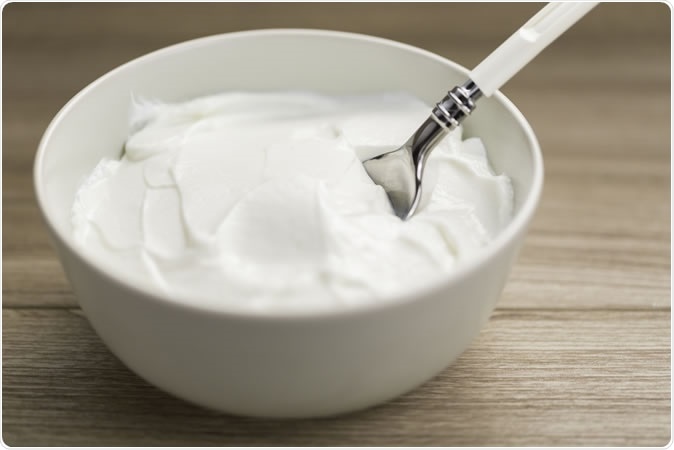The modern biomedical industry requires new approaches to the production of antimicrobials. The use of by-products from the food industry could represent a new and interesting development in the field of antibiotic production.
One product that has become more popular with consumers over recent years is Greek yogurt. However, the production of this product can be wasteful, so research has been carried out recently into its uses in the field of “green” antibiotics.

Image Credit: Anastasios71 / Shutterstock
Greek yogurt production
The production of Greek yogurt is a growth industry with an increasing market share. In the state of New York alone, annual production nearly tripled from 106,000 to 315,000 tons between 2007 and 2012. However, Greek yogurt production is an extremely wasteful process: three cups of milk are required to produce one cup of yogurt. The main component of the waste stream is acid whey, which has a comparatively high acidity, BOD (biological oxygen demand) and COD (chemical oxygen demand) concentration.
Combined with large volumes of wastewater, the COD/BOD elements mean that Greek yogurt production has a high environmental footprint; therefore, it makes sense to look at ways these waste by-products can be utilized in other industries.
Acid whey use as feedstock
Acid whey has shown promise as a feedstock for energy production via anaerobic processes. It has been widely used by Greek yogurt manufacturers to produce high-quality feedstock for animal husbandry due to the highly concentrated presence of sugars, protein and lipids. However, this is limited by the problem of lactose fermentation in rumen and the production of acid whey being higher than the demand for the animal husbandry industry. A large amount of this valuable by-product is going to waste.
Another problem that exists with utilizing acid whey for agricultural feedstock is the transportation of the excess to farms when local wastewater treatment doesn’t have the capacity, meaning that the process is both wasteful and economically unsound.
Utilizing acid whey for antibiotic feedstock production
Recent research has been carried out by a team led by Jiajie Xu, with the results of the study being published in 2018.
Utilizing a trial and error strategy, they found that acid whey can be converted to MCCAs (medium-chain carboxylic acids) including n-hexanoic and n-octanoic acid. MCCAs are precursors for biofuels and chemicals and can be used as ‘green’ antimicrobials. They proposed that the acid whey should be utilized as complex feedstock for a highly specific anaerobic fermentation pathway found within the carboxylate platform.
Their objective was to convert the acid whey from Greek yogurt production without external electron donors in a single reactor biome. It was found that acid whey contains sugars in addition to lactic acid, making this process more achievable when using this substrate.
Preliminary experiments that were carried out within a single bioreactor resulted in low specificity compared to produced carboxylic acids, however. Therefore, the team pivoted to a temperature-phased bioreactor system, converting the substrate into mostly lactic acid in the first phase and then into MCCAs in the second phase through chain elongation.
They placed two existing bioconversion schemes in series and phasing the microbiomes into different operating conditions (temperatures.) This required reducing the microbial pathways in each of these microbiomes. For the first time, bioconversion of a waste stream into MCCA via a lactic acid intermediate without additional electron donors was achieved.
Reducing the cost and carbon footprint of MCCA production
MCCA products have a much higher value of n-caprylic acid production rate per carbon atom than methane, but an economically intensive extraction/separation system is required which must be installed. Also, when chemicals such as ethanol or lactic acid (both very good electron donors) are not available in the substrate, these must be purchased by. There is also a significant effect upon the environmental footprint and therefore impact of industrialized MCCA production due to transportation and external manufacturing of the necessary components.
Both these factors lead to an exponential increase in the cost of any industrialized process using MCCAs, which makes it currently economically unviable at the scales of production needed for large-scale use as a feedstock and “green” microbial. The research that has been undertaken by Xi et al. has provided a proof of concept for a process that may be key to the future of sustainability and cost-reduction in this field.
Journal reference:
Jiajie Xu et al. (2018) Temperature-Phased Conversion of Acid Whey Waste Into Medium-Chain Carboxylic Acids via Lactic Acid: No External e-donor, Joule Vol. 2, Issue 2 Pages 280-295 https://doi.org/10.1016/j.joule.2017.11.008